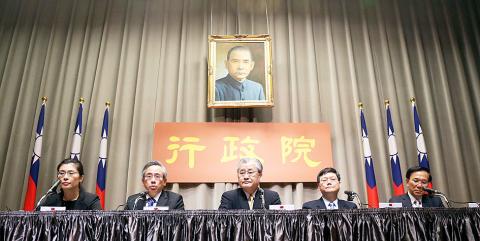President Ma Ying-jeou (馬英九) yesterday pledged to strengthen inspections on food and beverage manufacturers and severely punish those with problematic products amid a scare over adulturated cooking oils.
Presiding over the Chinese Nationalist Party’s (KMT) Central Standing Committee, Ma, who doubles as the party chairman, instructed the Ministry of Health and Welfare to hold a national food safety conference next month to address the issue.
“Food safety is a long-term issue, and the government will catch the bad manufacturers one by one and ensure food safety in Taiwan,” he said following the ministry’s report on the latest food safety scandal in which a major cooking oil company was found adulturating and mislabeling its oils.

Photo: CNA
As of Tuesday, the Chang Chi Foodstuff Factory Co had been fined NT$28.6 million (US$972,700) earlier this month, in accordance with the Act Governing Food Sanitation (食品衛生管理法), after authorities found that its products had been adulterated.
Suspicious consumers had questioned the quality of the firm’s cooking oil and tips from whistle-blowers in the company helped break the story.
Ma defended the government’s efforts to address food safety issues that have emerged in recent years, from plasticizers and toxic starch to the problematic cooking oils, and promised to increase manpower and budgets to enhance food safety.
“The problems have been there for a while, but they began to emerge only in recent years… It gives us a chance to examine the long-existing issues and resolve them,” he said.
Separately yesterday, Minister of Health and Welfare Chiu Wen-ta (邱文達), in response to repeated media enquiries on whether he would take political responsibility for alleged negligence in the food inspection process, said he “takes full responsibility for cracking down on ‘black-hearted’ food suppliers.”
“No matter when [the incidents] happened, [even] if it was my predecessor in the office, I will take full responsibility,” he said.
Meanwhile, Vice Minister of Economic Affairs Woody Duh (杜紫軍) said he disagreed with lawmakers who called for the Good Manufacturing Practice (GMP) certification — the government-backed label — be abolished on ground that the Chang Chi incident has proved the accreditation systems had been discredited.
Chang Chi was able to receive 17 GMP certifications for its edible oil products because it provided the Industrial Development Bureau with “misinformation about its manufacturing processes” to obtain the certificates, Duh said.
To address the loophole and others, the bureau is reviewing the GMP system and might require a manufacturer to present its import-export invoices and declarations and to allow on-the-spot inspection of its production lines when it seeks certification, Duh said.
The ministry will ensure that GMP is a guarantee for safety, Duh said, adding that “without the GMP system, consumers would be more exposed to unsafe foods.”
Duh said the ministry would complete ingredient testing of all 20 edible oil products advertised as 100 percent natural and unadulterated in two days and of all 129 blended cooking oil products within one week to ensure that products on the market are safe.
People who have information about suspicious food products can (02) 2325-0955, Duh said.

The brilliant blue waters, thick foliage and bucolic atmosphere on this seemingly idyllic archipelago deep in the Pacific Ocean belie the key role it now plays in a titanic geopolitical struggle. Palau is again on the front line as China, and the US and its allies prepare their forces in an intensifying contest for control over the Asia-Pacific region. The democratic nation of just 17,000 people hosts US-controlled airstrips and soon-to-be-completed radar installations that the US military describes as “critical” to monitoring vast swathes of water and airspace. It is also a key piece of the second island chain, a string of

A magnitude 5.9 earthquake that struck about 33km off the coast of Hualien City was the "main shock" in a series of quakes in the area, with aftershocks expected over the next three days, the Central Weather Administration (CWA) said yesterday. Prior to the magnitude 5.9 quake shaking most of Taiwan at 6:53pm yesterday, six other earthquakes stronger than a magnitude of 4, starting with a magnitude 5.5 quake at 6:09pm, occurred in the area. CWA Seismological Center Director Wu Chien-fu (吳健富) confirmed that the quakes were all part of the same series and that the magnitude 5.5 temblor was

The Central Weather Administration has issued a heat alert for southeastern Taiwan, warning of temperatures as high as 36°C today, while alerting some coastal areas of strong winds later in the day. Kaohsiung’s Neimen District (內門) and Pingtung County’s Neipu Township (內埔) are under an orange heat alert, which warns of temperatures as high as 36°C for three consecutive days, the CWA said, citing southwest winds. The heat would also extend to Tainan’s Nansi (楠西) and Yujing (玉井) districts, as well as Pingtung’s Gaoshu (高樹), Yanpu (鹽埔) and Majia (瑪家) townships, it said, forecasting highs of up to 36°C in those areas

IN FULL SWING: Recall drives against lawmakers in Hualien, Taoyuan and Hsinchu have reached the second-stage threshold, the campaigners said Campaigners in a recall petition against Chinese Nationalist Party (KMT) Legislator Yen Kuan-heng (顏寬恒) in Taichung yesterday said their signature target is within sight, and that they need a big push to collect about 500 more signatures from locals to reach the second-stage threshold. Recall campaigns against KMT lawmakers Johnny Chiang (江啟臣), Yang Chiung-ying (楊瓊瓔) and Lo Ting-wei (羅廷瑋) are also close to the 10 percent threshold, and campaigners are mounting a final push this week. They need about 800 signatures against Chiang and about 2,000 against Yang. Campaigners seeking to recall Lo said they had reached the threshold figure over the